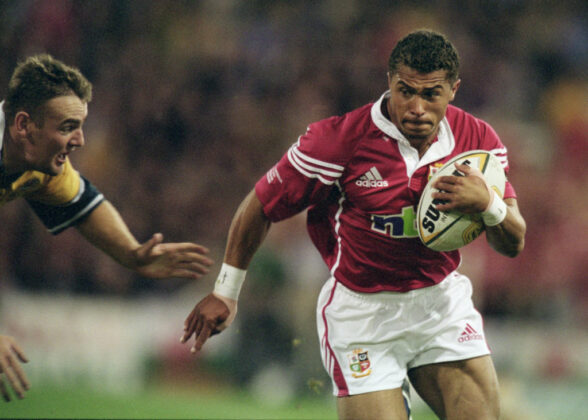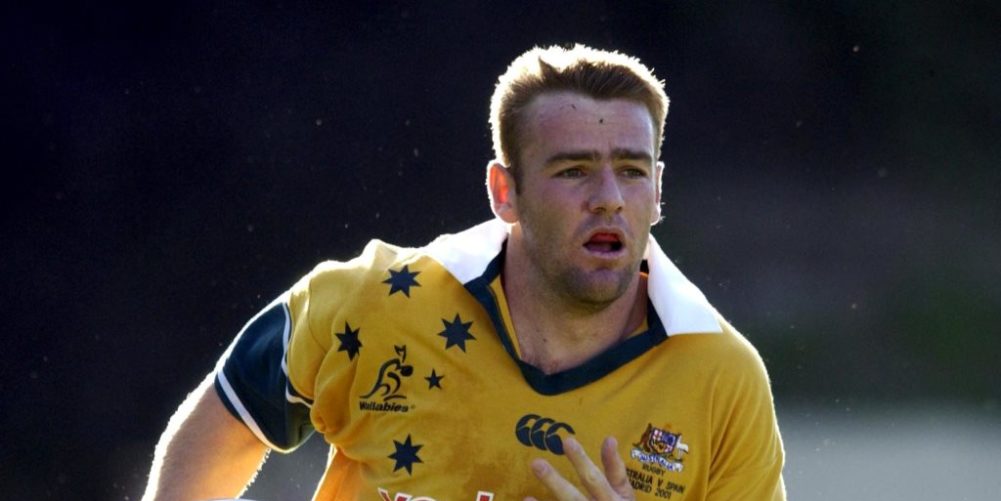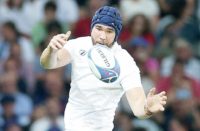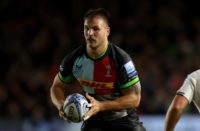Former Australia, Queensland Reds and Worcester Warriors full-back Chris Latham reflects on his career encompassing World Cup defeat and the Lions, and his coaching career which has taken him to Major League Rugby.
I was a huge, huge soccer fan growing up – I loved it and still support Manchester United. I kind of fell into rugby at the age of 17 and that was my passage out of a small country town and into the city.
Coming into the game so late, I was very immature from a skills and knowledge point of view. It may sound strange from a full-back who won 76 caps for his country, but I didn't know how to kick the ball out of hand properly when I started. Virtually every day in my 14-year career I practised it. If I ever slackened off, everything would leave me as it wasn't a natural skill, it was a learnt skill, and I needed to keep doing it.
I didn't know what my game was or who I was as a rugby player at that stage, and that's what I wanted to discover. I was also very ambitious to get as far as I could and stamp my mark. I knew the harder I worked, the luckier I got and people still say to me, ‘you were the first into training a couple of hours before everyone else and the last the leave'. I ran into John Connolly the other week and he recalled how he remembered me being at Ballymore on our day off practicing catching and kicking on my own.
I wanted to be a player that was unpredictable, that player the opposition would analyse and think, ‘we just don't know what he is going to do'. Sometimes the things I tried didn't come off and, if you look back at my career, I don't know if there is such a stat, I'd be probably one of the most dropped players in Wallaby history, even though my first nine caps for the Wallabies were all wins.
I'm sure there was always a valid reason for being dropped and that made me work harder at my game. Had it not been that way, I may not have played as many Tests and got to where I got to. The things that I wanted to do and tried to do, I didn't see them as impossible or low-percentage things, because I'd trained and practiced to make sure the skill was there but if you are someone who skates on the edge, sometimes these things don't come off.
The first of my three World Cups was in 1999. I only played in one game, against the USA in Limerick, but I was very young and raw to the environment so to get the opportunity just to be involved was amazing and one I cherish a lot. To only play one game at the next World Cup, when I had five years of international rugby behind me, was bitterly disappointing, however. I was devastated – even though I scored five tries in the match!
Like with most things in life, there's a story behind it. Leading up to the 2003 World Cup, I think it was a couple of months out, we played a Test match against New Zealand in Auckland and before I ran out, I had a 39-degree temperature. We had no one to cover so I played. I always felt I was fortunate to play Test matches so when you are on against the All Blacks you don't shy away, you just man up and get on with it. After the game, I went home and went to bed and woke up really, really sick the next day. I flew back to Australia and my wife was really concerned and called the doctor. He said I needed to go to hospital straight away. I ended up getting pneumonia. I had three super bugs in me and I spent the next two weeks hanging upside down draining my lungs of fluid and recovering.
Two days after I got out of hospital, I had to be in Darwen for a World Cup camp. My lungs weren't any good, I couldn't complete most of the training sessions, and as a result I sat out the first few games. The Namibia game was really about me proving my fitness; I wanted to show that I would run myself to victory or death. The by-product was the five tries.
In between those World Cups, I had two amazing rugby experiences, even though I was on the losing side in both. The first was in 2000, when a Jonah Lomu-inspired New Zealand beat us 39-35 in what is reckoned to be the best Test ever played. At the time, I didn't feel that way. Rugby is a results business and the feeling in the changing room wasn't, ‘that was a great game', it was one of disappointment. Plus I'd gifted them 14 points! No matter where we were, or who we were playing against, we were there to win.
The stadium in Sydney was purposefully built for the Olympics that year, and we'd been told during the week that they'd left portable seats in the stadium and there was an opportunity for a world record crowd of 109,000. So that was the build-up and then there was the Test match itself against New Zealand, which is always a special occasion. Thankfully, the game lived up to the hype.
The following year, we played and beat the British & Irish Lions after we'd come back from losing the first Test in Brisbane. My main memory of the 2001 Lions series is seeing the back of Jason Robinson's heels – that and the incredible Lions support.

When Jason ran towards me, I thought, ‘five metres, surely that's enough to cover myself, he'll step inside as he always does'. He started to come in and revved up those little legs of his and took off again. If you look back on your career and you're ashamed of things like that, you have got to take a hard look at yourself because you're just in a very long queue of people who've been burnt by Jason and run over by Jonah.
Not only did that Lions series push rugby into the hearts and minds of all Australians, it also showed Australians how to support rugby, given what they learnt and saw from the Lions fans. They ambushed us that day in Brisbane with the volume of noise. It was just amazing. I think it really shocked Australian fans that you could be so noisy and passionate and get lost in the game itself for its purity as a contest. In the age of social media, there are all these bells and whistles when you go to a game: fireworks, dancers… you name it. We are starting to lose the essence of the game. If you could package one situation from my whole experience of rugby in how it should be supported and showcased, that Lions Test was it.
My participation at France 2007 was in doubt for some time. I'd returned home from our November tour to Europe and went straight into training with the Queensland Reds a month early. But I blew my knee out in my first session back. It needed a reconstruction and, back then, the recovery time was 12 months and the World Cup was only six months away. However, I had a good medical team around me and we did it in six … just!
People would probably say my career took off after I joined the Reds in 1999. For me, the highlight of my time was every time I got to play at Ballymore. I've played in some the best stadiums in the world – the Stade de France, where I made my debut is amazing; there's Twickenham with its history, wonderful playing surface and the singing of the England fans; the Millennium Stadium and its surround sound-type atmosphere when the roof is on; and a jam-packed Ellis Park in Jo'burg is electric. But Ballymore tops the lot for me personally, with its hooligans on the hill and three stands tight to the pitch right on top of you. It was what I really lived for back then to run out at Ballymore and see that hill. It made me come alive. I just wanted to bust my ass to make sure I got a try down there.
In 2008 I decided to go to Worcester and experience what it was like to play in Europe. I was fortunate the new stand had been built at Sixways and the fans generated a brilliant atmosphere there, and also away from home. I enjoyed my time at Worcester, it opened my eyes to a different style of rugby.
Why did I retire? I'd just had enough, I became bored of rugby. At that stage I was in Japan and I could have stayed on at the club – Kyuden Voltex – if I'd have wanted to, but rugby, for me, was never about finance it was all about enjoyment and growth and I'd had enough. Six months later, I missed it and that reinvigorated me to get into coaching. Coaching has its own unique challenges, but overall I really enjoy it. It's fascinating to see how different players learn and react as you try and find different ways to get to a common goal.
I'm back home in Brisbane due to Covid but the three months I had in Utah, as head coach of the Warriors in the MLR, were enjoyable. Results for Utah hadn't been good for the previous two seasons so it was an exciting challenge and we were starting to see some good results and play some nice footy. Hopefully, we can pick up from where we left off when the new season starts.
– as told to Jon Newcombe


























